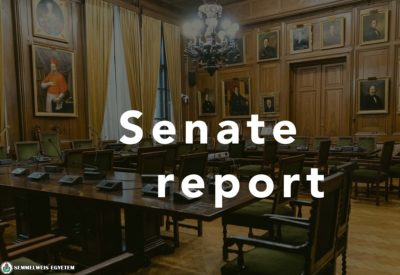At its April meeting, the Senate decided to amend the provisions of the Organizational and Operational Rules (SzMSz), in line with the changes in the organizational structure. The amendments harmonize the Clinical Center’s rules of procedure with the SzMSz; clarify the rules governing the composition of the Clinical Center’s presidency; affect the structure of the Directorate of HR Controlling and Career Management; and include amendments of a technical legal nature. The Institute of Clinical Data Service is included in the Organizational and Operational Rules, the Directorate of HR Process Management is created, and the Directorate of HR Controlling and Career Management is renamed to Directorate of Labor Management. With these amendments of a technical legal nature, the SzMSz reflects the organizational changes of the Directorate of Dormitories.
The board decided to amend the Clinical Center’s rules of procedure to introduce technical legal changes reflecting the amendments to the Organizational and Operational Rules.
The senators discussed and approved amendments to certain provisions of Book III of the Organizational and Operational Rules. As a result, the new courses will be listed in both the Admission Regulations and the Study and Examination Regulations: the Health Care Quality and Patient Safety Management master’s program at the Faculty of Health and Public Administration (EKK); and the Neuro-rehabilitation master’s program at the András Pető Faculty. As part of the amendment, the Admission Rules are modified as regards the EKK’s Lactation Consultant specialist training course and the newly introduced Active Ageing specialist training course at the Institute of Mental Health. The Senate has also decided to amend the Remuneration and Benefits Policy: at the request of the Students’ Union, the number of places in dormitories reserved for appeals will be reduced.
The Senate approved to launch a Scientific Editor online international specialist training course in English. A scientific editor is a professional with a BSc or MSc degree in science or other disciplines who demonstrates an outstanding proficiency in English for specific purposes and scientific editing skills in both written and oral forms scientific and awareness-raising communication in their field. The training available for scientific editors focuses primarily on medicine and health sciences but is also open to other disciplines. The postgraduate specialization is offered primarily to PhD supervisors, Students’ Scientific Association (TDK) supervisors, leaders and members of international research groups as well as international students. The practice-oriented courses are scheduled in blocks.
The Senate agreed to introduce the elective courses Language Club I-VI. Launched within the framework of the Institute of Languages for Specific Purposes, the courses aim to provide Semmelweis students from different fields of study with a 90-minute weekly opportunity to develop their communication skills in English, German, or Hungarian, from beginner to advanced level.
The Board also decided to introduce the subject Miscellaneous Tasks Performed as a Student Member of Admission Committees or as a Student in the Context of the Admission Process. Depending on the tasks performed (assistance or committee membership) and the time allocated to them, the subject will be awarded 1 or 2 credits, thus rewarding extra tasks undertaken during the admission process.
The Senate approved to launch an elective courses Industrial Research and Discovery of Pharmaceutical Molecules I-II. The Richter Department’s course, held in Hungarian, is open to active students of the Faculties of Medicine (ÁOK), Dentistry (FOK), and Pharmaceutical Sciences (GYTK). The course can be taken upon successful completion of the Pharmacology course at the ÁOK and FOK and the Biochemistry and Physiology courses at the GYTK. The lecturers of the course are experts from the Richter Gedeon pharmaceutical company, at the invitation of the Richter Department.
The board voted on the organizational changes in the education and research departments of the Intensive Therapy Clinic at ÁOK. Accordingly, the Clinical Simulation Departmental Group will be demerged from the Intensive Therapy Clinic and become part of the Department of Anesthesiology and Intensive Therapy; and the Volunteer Medical Reservist Departmental Group will be demerged from the Intensive Therapy Clinic and merged into the Department of Defense, Disaster Management and Law Enforcement.
The Senate adopted the proposal on updating the model curriculum of the Faculty of Health and Public Administration. The decision was taken in the framework of the curriculum reform.
The senators adopted the report of the Quality Improvement and Assessment Committee for 2023 and decided to amend the Rules of Procedure of the committee as regards administrative provisions.
The Senators voted on bestowing the Pro Universitate Lifetime Achievement Award, the Pro Universitate Award, and the Semmelweis University Outstanding Teacher Award. Furthermore, the board reviewed current applications for senior management and teacher positions.
Anita Szepesi
Translation: Judit Szabados-Dőtsch
Photo by Attila Kovács – Semmelweis University

